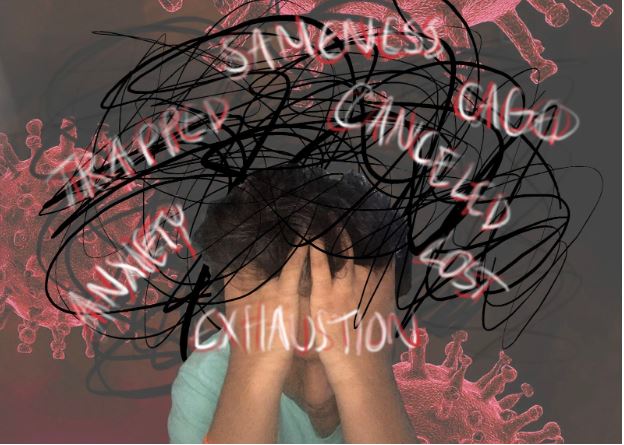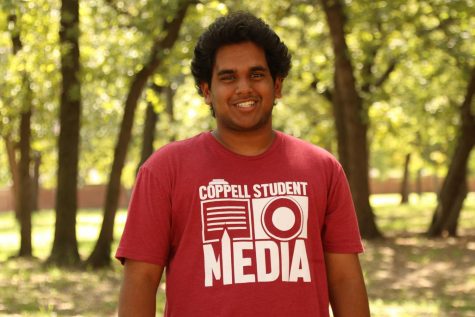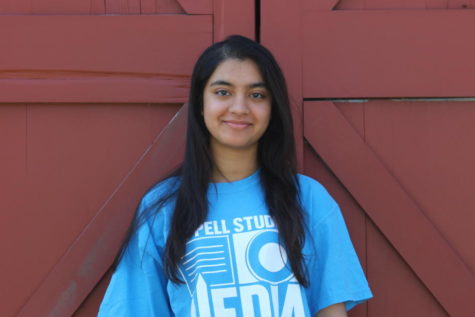Hidden toll of COVID-19: Mental Health
The onset of COVID-19 has started taking a negative impact on the mental health of many Americans. The Sidekick staff writer Meer Mahfuz explains the emotional toll it has taken on him personally and discusses a silver lining in all of this.
May 8, 2020
Every morning I wake up feeling trapped. Every night I go to bed feeling trapped. Trapped inside my house. Trapped in a monotonous routine. Drowning in a pool of never-ending thoughts. Losing my sense of reality. Caged in by the parameters of this global pandemic.
Since March. 13, my life has been the exact same everyday.
Waking up midday, followed by staring at my wall for two hours as I contemplate reasons to even get out of bed. When I finally get up, I take a shower, go downstairs to eat, finish my school work and then my day is complete so I head back to bed.
Back-to-bed meaning that I will lay in my bed for six or so hours drowning in a pool of my thoughts, thinking my future, my past, my current life, things I miss, people who I want to see, losing soccer and my teammates, this pandemic itself as well as many other in-the-moment thoughts.
At first, I thought isolating at home would be a breeze and that I would just have to wait it out so that life can go back to normal. I was wrong. Everyday I see my limited amount of motivation and willpower fade as my mind slowly slips into an abyss.
What I am struggling most with, however, is the overwhelming toll that my emotions are taking. Normally, the aforementioned feelings were still existent but my lifestyle, filled with numerous diverse activities, helped lighten and in a way, distract me from my emotions. My jam packed schedule, filled with soccer, school, student journalism, music and methods of entertainment, simply took so much time out of my life that I wouldn’t be able to focus on my emotions for a long period of time.
The timing of COVID-19 is what makes this experience especially painful. As many of us enter Ramadan (Islamic holy month), social distancing orders usher in an unprecedented, confusing time for many. While exhaustion of a 15-hour long fast has been somewhat mitigated, due to the lack of energy consuming activities, many spiritualistic and community aspects of this month have been severely damaged. This situation has gotten so dire that the Kaaba (original and most famous mosque), which brings millions of people together year-round, was closed for the first time in 1,412 years.
Even going back to last year, I can remember hundreds, if not thousands, of Muslims flocking to a mosque to have Iftar (breakage of fast) with each other and to participate in many nightly prayers. And while I am still able to complete all prayers and fasts, it just isn’t the same doing it with four people in my house for 30 days compared to doing it with thousands of others from around the metroplex.
Muslims are part of a growing number of people left feeling stranded by COVID-19, unknowing of how to deal with their new emotions. A recent Kaiser Family Foundation report found that 45% Americans state that COVID-19 has taken a negative impact on their mental health, 19% of which state that their mental health has been majorly impacted. Mounting fears of potentially falling ill, dying, losing jobs, bankruptcy and losing family/friends have all contributed to growing numbers of anxious and depressed Americans.
I have seen my life, my sense of reality and my emotions that make me happy get crushed as a result of this global pandemic. Even then, I am one of the luckier ones because I haven’t lost any family members, I haven’t lost a job, I haven’t lost any food or resources and crucially, I haven’t been on frontlines to truly understand the effects of COVID-19 like many in healthcare situations.
Not all hope is lost, however. An influential COVID-19 projections model, created by Institute of Health Metrics and Evaluation at the University of Washington, projects that daily death rates have already taken a drastic downfall and that nearing end of May or beginning of June would see drastically low numbers in terms of deaths and medical resources required in response to COVID-19.
To everyone that has been gravely impacted by coronavirus, I tell you one thing: hang in there, your bravery and courage during this hardship will forever be remembered and that I greatly appreciate and am here for every single one of you.
Please check in with people you haven’t seen or heard from in a long time because you never know what someone is going through. For tips on how to have and maintain a positive mindset, please click here.
Follow@meer_mahfuz and @CHSCampusNews on Twitter.











